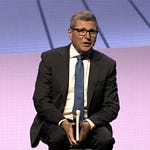I have posted both of these encounters in full on the Powerlines Substack but decided to butt these two excerpts together, just for the fun of it.
Compare them. Share them.
The first was before the 2022 election, with the then–Shadow Minister for Climate Change and Energy, Chris Bowen. At the time, he was selling a promise: Labor’s climate policy, underpinned by RepuTex modelling, would cut household power bills by $275 by 2025. Which is, well, now.
I argued his modelling was fatally flawed. It ignored a fundamental fact about how electricity is priced on the wholesale market: not by the cheapest, but by the highest cost of generation. You can plaster the nation with wind turbines and solar panels but if the last megawatt-hour needed for supply to meet demand hits the market cap of $17,500, then that’s what every generator will get paid.
And that’s before you start pricing in the enormous costs of transmission, distribution, storage…
Bowen was unmoved. Wind and solar are the cheapest forms of generation, he said. Therefore, prices would fall.
Labor won. Prices rose. And kept rising. They soared so high that both state and federal governments began subsidising bills to dull the pain of their policy failure. The Commonwealth’s contribution alone now stands at $6.8 billion. That’s taxpayer money, laundered back into households and badged as “cost-of-living relief.”
It’s potent theatre: a Ponzi scheme in policy drag.
Then came the linguistic laundering. On Budget night, this line appeared in the Treasurer’s speech: “Electricity prices went down 25 per cent here last year...” But it is axiomatic that if prices were falling, the government wouldn’t need to subsidise them.
The get-out-of-jail-free line now etched into Labor’s talking points is: “Electricity prices are higher than we would like.” Amen to that. But surely, when confronted with the evidence of price rises written into everyone’s bill, a simple acknowledgement of fact shouldn’t be too much to ask for.
Which brings us to the second encounter — last week — when the now-Minister Bowen fronted the National Press Club. The question was simple:
Have electricity prices gone up or down on Labor’s watch?
You watch. You decide.














Share this post